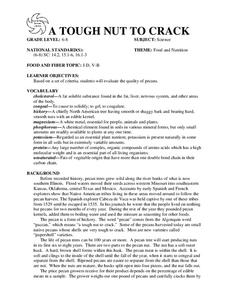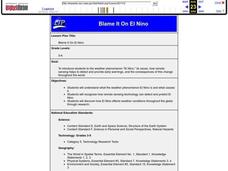Curated OER
Recording Local Weather
Second graders measure, record, graph, and report changes in local weather using Navajo, Ute, and Spanish words for weather conditions. They record the weather results on a graph, and create drawings of weather conditions.
Curated OER
The Galapagos Islands
In this The Galapagos Islands learning exercise, students read a 1 page article, answer 3 statements with multiple choice answers, fill in 4 fill in the blank answers and 3 determine if 3 statements are true or false.
Curated OER
Sense-sational
Students investigate the five senses. They participate in the lesson for one week with each day devoted to one sense being sight, taste, sound, smell, and touch. They also cover the concept of being part of a global community where one...
Curated OER
Manatee Facts
For this math and science worksheet, students learn facts about the manatee by reading information on one page. Students answer 5 math word problems using the data they have read.
Baylor College
Safe Food Preparation
Who doesn't love ice cream? Make this delicious dessert with your class while learning about food preparation in the tenth instructional activity of this series. Teach about the importance of cleanliness and proper cooking techniques in...
Desert Discoveries
Invent - A - Saurus
Fourth graders get to invent their own dinosaur! This is done by using a very clever worksheet embedded in the plan. The worksheet leads them through naming their dinosaur by having explanations of the Latin terminology that is used with...
Curated OER
Battle of New Orleans
Students use the Internet, encyclopedias, and other library resources to discover basic facts about the Battle of New Orleans and the 1768 revolt by French colonists in Spanish Louisiana. They examine two websites that give information...
Curated OER
A TOUGH NUT TO CRACK
Based on a set of criteria, students will evaluate the quality of pecans.1. Bring a gram scale and papershell pecans. Provide five pecans for each student. 2. Divide the class into groups of five and provide each member with five pecans....
Curated OER
Surface Water Supplies And The Texas Settlements
Young scholars engage in a instructional activity that is concerned with the allocation and finding of water resources. The location of different settlement areas is considered as one looks how the water is distributed. They map some of...
Curated OER
GET THE POINT!
The student will measure the width of the horns on drawings of longhorn cattle and then convert the measurements from inches to centimeters and from inches to feet.1. Review with students the steps required to measure an item and to...
Curated OER
Aquatic Safari
Students use an Internet Web site to locate the scientific information about various marine species. They use the Internet to find the scientific information about marine animals.
Howard Hughes Medical Institute
The Making of the Fittest: Got Lactase? The Co-evolution of Genes and Culture
Got milk? Only two cultures have had it long enough to develop the tolerance of lactose as an adult. Learn how the responsible genes evolved along with the cultures that have been consuming milk. This rich film is supplied with a few...
Curated OER
TECH: Geneticist
A brief PowerPoint is used to introduce the class to the field of genetics by explaining the fields of work, the education required, and the job prospects. A trait inventory worksheet is completed by individuals, and then they gather...
Center Science Education
Investigating the Climate
What do graphs of atmospheric gases over time show us? Do they indicate that carbon sources and carbon sinks are not in balance? Up-and-coming meteorologists watch video clips, read information, and analyze data from the HIPPO (HIAPER...
Center Science Education
CO2: How Much Do You Spew?
Split your earth science or environmental studies class into groups and give each a scenario card. Scenario cards describe the lifestyles of 10 different fictitious families, focusing on their energy usage. Carbon dioxide emissions are...
Curated OER
A Discourse on the History of Language
Analyze and make inferences from the information used by linguists to construct the evolution of languages. They research different dating techniques to explain how scientists infer age with evidence.
American Museum of Natural History
What Do You Know About Horses?
A 10-question online quiz tests scholars' knowledge about horses: all answers come with an informative explanation.
Curated OER
Blame It On El Nino
Students study the weather phenomenon El Nino is and what causes it, and recognize how remote sensing technology can detect and predict El Nino. Students discover how El Nino affects weather conditions throughout the globe through research.
California Academy of Science
A Day in the Life of a San Francisco Native Animal
Before Google, before Sillicon Valley, before the Gold Rush, the San Francisco landscape was a biome filled with grizzly bears, mule deer, tule elk, coyotes, gray fox, gophers, and moles. To explore the early days of yesteryear, kids...
NOAA
Ocean Exploration
Sea explorers and scientists have found that because of temperatures being two to three degrees Celsius at the bottom of the ocean, most animals are lethargic in order to conserve energy. In this web quest, pairs of learners read about...
Agency for Toxic Substances and Disease Registry
Don't Mess with Mercury (Lesson C)
The health effects of mercury exposure if the focus of the first of three activities about the properties of metals. Pairs research mercury to write, prepare, and share posters, articles, or PSAs with the class.
Agency for Toxic Substances and Disease Registry
Don't Mess with Mercury (Lesson A)
Mercury is the only metal that is a liquid at room temperature. Teach your class this and many more interesting mercury facts by assigning an engaging task. A public relations activity, the exercise informs pupils of the hazards of...
Curated OER
Space Flight Simulation
Students engage in the study of flight with the help of a computer flight simulation. They take part in a variety of activities that imitate the Space Shuttle Endeavor. Students work as teams like the astronauts would to complete mission...
University of Wisconsin
Bimodel Botany Bouquet
Gardeners are given an individual plant specimen from a bouquet of local rain garden plants. They group up by their plant type and then make observations together, name the plant, and introduce it to the rest of the class. You then share...
Other popular searches
- "Spanish 1" Language
- Spanish 1 Spanish I
- Spanish Counting to Ten
- Spanish Numbers 0 100
- Spanish 1" | "Spanish I
- Counting From 1 10 in Spanish
- Spanish Counting to 100
- Spanish Numbers 1 30
- Spanish Exploration 1600
- Spanish Flu of 1919
- 1919 Spanish Flu
- Spanish Numbers 1 100

























